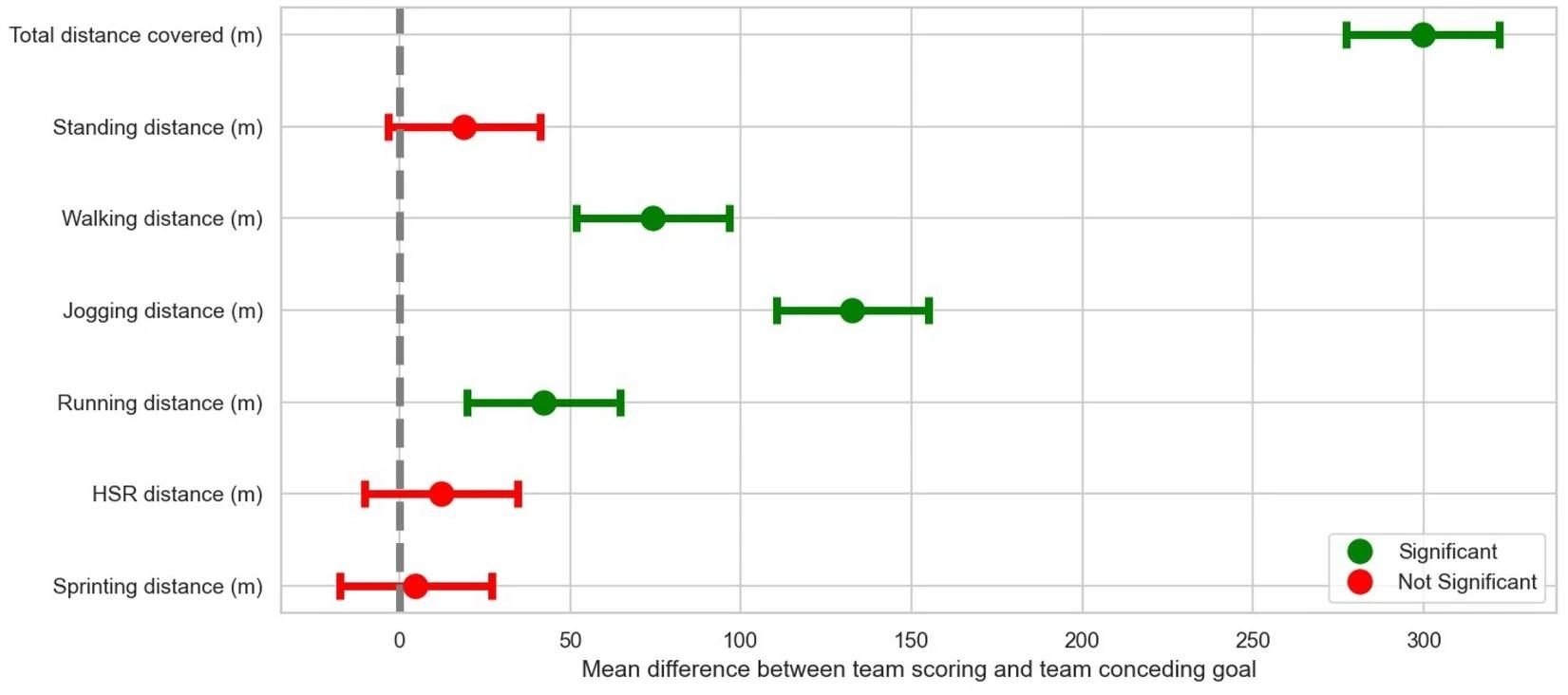A study has been conducted on professional soccer players to explore the potential differences in match running performance five minutes before scoring a goal or conceding a goal.
The match-running performance of professional soccer players depends on various context-related factors, including match status, match outcome, and quality of opposition, among others. The inter-relationships between these factors are well documented in the literature.
Evidence indicates that high-ranked teams cover more total and sprint distances than low-ranked teams. While soccer players exhibit higher physical intensity during the defensive phase of the match, a lower physical intensity is generally observed during the offensive phase of the match.
Studies analyzing the inter-relationship between physical performance and match status indicate that the final match result depends on short moments within the game where the team scores or concedes a goal.
These short moments significantly contribute to the ability to score goals. In this context, previous studies have shown a reduction in match running performance with a 5-minute period following intense efforts.
In this study, scientists have compared the match-running performance of professional soccer players five minutes before a goal between the scoring team and the conceding team in the Polish Ekstraklasa.
Study design
The scientists used a computerized tracking system to collect data on the match running performance of teams competing in official league matches of the Polish Ekstraklasa during the 2022/23 season.
They divided the entire match data into 5-minute time intervals to determine the exact moments of goals scored during the matches. They further analyzed these intervals to determine the exact values of the match running performance five minutes before scoring or conceding a goal.
The final sample comprised 278 matches with 570 goals scored in the Polish Ekstraklasa. The match running performance parameters that were assessed in 5-minute intervals included total distance covered, standing distance, walking distance, jogging distance, running distance, high-speed running distance, and sprinting distance.
Important observations
The study found that compared to teams that conceded a goal, goal-scoring teams exhibited higher values of all tested parameters during the last five minutes before the goal was scored.
Specifically, goal-scoring teams exhibited significantly higher total distance covered, walking distance, jogging distance, and running distance compared to goal-conceding teams. The differences in other tested parameters were not statistically significant between the teams.
Study significance
The study finds that soccer teams that scored a goal in the Polish Ekstraklasa have higher match-running performance than goal-conceding teams during the last five minutes before goal scoring.
Specifically, the study depicts significant differences between scoring teams and conceding teams in the distance covered during low-to-moderate intensity match running performance, suggesting that different running behaviors characterize pre-scoring and pre-conceding situations in soccer.
 Differences in 5-min match running performance between scoring and conceding teams in the Polish Ekstraklasa (mean ± SD).
Differences in 5-min match running performance between scoring and conceding teams in the Polish Ekstraklasa (mean ± SD).
Coaches and performing staff may consider these findings, which indicate an increase in low-to-moderate intensity running efforts preceding a goal, to optimize the training process and improve team-level and individual-level match performance.
The current findings contrast previous studies that have predominantly shown a correlation between match scores and high-intensity running performance.
High-intensity efforts require significantly longer recovery periods, during which players try to maintain effective activities, such as walking, jogging, and running. These activities help players achieve faster recovery between high-intensity efforts.
Thus, increasing the frequency of high-intensity efforts may imply modified team tactical and pacing behaviors and potentially increase the running distances covered at low—and moderate intensity.
Although low-to-moderate intensity activities are not always associated with a more effective high-intensity attack, through organized movement of the entire team, these activities may be an effective strategy to employ during a positional attack.
The current study included data for all teams, and high-intensity efforts are characteristics of players playing in specific positions. In this context, previous studies have shown that attackers cover 15% and 54% more high-intensity running and sprinting in successful matches compared to unsuccessful matches. Whereas, central defenders cover 10-17% less high-intensity running in successful matches compared to unsuccessful matches.
Overall, existing evidence suggests that the running performance of goal-scoring teams depends on team formation or player's individual characteristics. Furthermore, in elite soccer players, playing position and match location have been found to have a higher impact on the frequency of high-intensity efforts than the quality of the opposition.
Given these observations, the current study scientists highlight the need for future studies to investigate positional variations in running performance before scoring and conceding a goal.